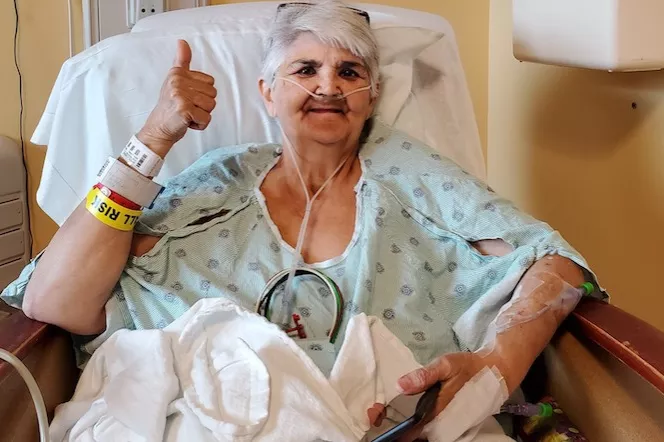- AdventHealth

After 71-year old Carol Dunn from Genieva learned that she had atrial fibrillation (AFib), her health took a turn that affected her whole health and quality of life.
“I’ve had heart problems for quite a few years. Since my diagnosis [of AFib], things have gotten worse and worse,” Dunn said.
One of the complications that Dunn experienced was mitral regurgitation, a condition caused when the heart's mitral valve doesn't close tightly, allowing blood to flow backward in the heart. Mitral regurgitation can cause shortness of breath and a rapid, fluttering heartbeat. It can also life-threatening if not treated.
Dunn’s cardiologist referred her to Dinesh Arab, MD, interventional cardiologist at AdventHealth Daytona Beach, for help.
Dr. Arab is the primary interventional cardiologist at AdventHealth Daytona Beach performing a highly specialized minimally invasive procedure to treat mitral regurgitation called MitraClip.
In fact, Dr. Arab performed the first MitraClip®procedures in Volusia, Flagler and Lake Counties.
As part of our overall Structural Heart Program, a multi-team approach with specially trained cardiac surgeons and cardiac anesthesiologists collaborate on complex procedures such as the MitraClip®. For Mrs. Dunn's case, cardiac surgeon Utpal Desai, MD, MD and cardiac anesthesiologist Ayman Mijali, MD were present.
Facts About the MitraClip®
Traditionally, mitral valve surgery is performed with open-heart surgery that requires a large incision down the chest. For patients who couldn’t undergo open-heart surgery, there weren’t any other treatment options.
That is, before the MitraClip®, which offers patients like Dunn an alternative to open-heart surgery. This less-invasive treatment option often requires only a two- to three-day hospital stay, on average.
“MitraClip®is a procedure with lifesaving and life-extending capabilities,” explains Dr. Arab. “Now, we can offer this to many of our patients who are not able to have open heart surgery because of the high risk of complications.”
Facts About Mitral Valve Regurgitation
In a healthy heart, blood travels from one heart chamber to the next, moving oxygen throughout. Flaps of tissue called leaflets are located between each chamber. The leaflets close tightly after each pump to prevent oxygenated blood from moving backwards.
With mitral regurgitation, the leaflets don’t properly seal, which allows blood to flow back into the heart’s atrium.
This can increase blood volume and pressure in the heart, which can increase pressure in the veins leading from the lungs to the heart. If severe, this may cause fluid to build-up in the lungs.
Dr. Arab explains that sometimes, mitral regurgitation does not present any symptoms, but more severe cases can cause:
- Heart palpitations
- Shortness of breath
- Persistent coughing
- Fluid around the heart and lungs
- Swelling of the legs and feet
How the MitraClip® Treats Mitral Regurgitation
The MitraClip® is an advanced surgical procedure, yet it’s performed minimally invasively.
Interventional cardiologists like Dr. Arab implant the MitraClip® device through a tiny needle puncture in the skin and use a catheter to guide the MitraClip® through the heart, where it is attached to the leaflets.
As a result, the MitraClip® ensures that the heart’s valves are closed, therefore correcting (or significantly reducing) the regurgitation.
“Patients usually find relief of symptoms very soon after surgery,” Dr. Arab explained. “Long-term, patients benefit with reduced hospitalizations related to untreated mitral regurgitation, a decreased risk of heart failure and an improved quality of life.”
For most recipients of the MitraClip®, the procedure leaves them feeling almost immediate results with a significantly shorter recovery time compared to open-heart surgery.
Just hours after Dunn’s MitraClip® procedure, she expressed how pleased she was with the procedure.
“It’s been very smooth. Everyone here is super-duper nice, and everything is nice and clean. And it’s been a good experience really,” she said. “These new procedures are fantastic!”
Learn more about AdventHealth Daytona Beach’s advanced Heart and Vascular Care.




